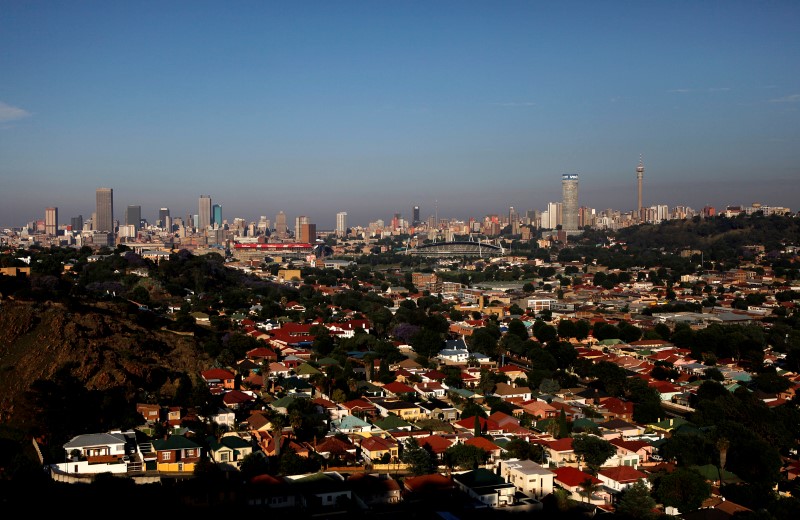By Alexander Winning and Karin Strohecker
JOHANNESBURG/LONDON (Reuters) - Moody's left South Africa on the brink of "junk" status on Friday after it revised the outlook on the country's last investment-grade credit rating to "negative," piling pressure on President Cyril Ramaphosa to quicken the pace of reform.
Moody's said the outlook revision on its 'Baa3' rating, the lowest rung of investment grade, was motivated by a deterioration in the economic growth outlook and rising debt.
Analysts had expected the move after a bleak mid-term budget statement this week that slashed this year's growth forecast to 0.5% and showed government debt racing to more than 70% of gross domestic product by 2023.
The rand tumbled more than 2.5% over the past week against the dollar, its sharpest weekly drop since early August. Yields on local 10-year government bond issues (ZA10YT=RR) traded on Monday at just over 8% but climbed as high as 8.6% following the dire budget predictions.
The negative outlook means there is a window of 12-18 months in which a downgrade could be delivered, but it could come sooner if Moody's isn't impressed by the fiscal picture presented at the next budget statement in February.
"The development of a credible fiscal strategy to contain the rise in debt, including in the 2020 budget process and statement, will be crucial to sustain the rating at its current level," Moody's said in a statement after South African financial markets had closed.
It added that its new outlook reflected rising concern that the government would not find "the political capital to implement the range of measures it intends, and that its plans will be largely ineffective in lifting growth".
The finance ministry responded by saying the country had "a narrow window to demonstrate faster and concrete implementation of reforms".
Ramaphosa has struggled to revive Africa's most advanced economy since taking over from scandal-plagued Jacob Zuma in February 2018.
The wave of optimism among foreign and local investors that accompanied his rise to power has fizzled out as the economic challenges have grown more acute, with unemployment reaching an 11-year high above 29% and state power company Eskom struggling to keep the lights on.
One of the greatest worries is rising government debt, which shows no signs of stabilising soon amid repeated bailouts for state-owned companies.
South Africa debt: https://fingfx.thomsonreuters.com/gfx/mkt/12/8121/8052/SA.png
'CONSISTENT UNCERTAINTY'
Fund managers said they were not expecting a steep sell-off in government bonds and the rand when financial markets re-open on Monday, because the outlook revision was expected by so many and South African assets had fallen sharply over the past week.
The spread of South African dollar debt over U.S. Treasuries is already wider than on some junk-rated sovereigns, reflecting longstanding concerns over the country's fiscal health.
"Valuations are already reflecting this outcome. So on any sell-offs, we would see it as a buying opportunity," said Jean-Charles Sambor, deputy head of emerging market fixed income at BNP Paribas (PA:BNPP) Asset Management.
S&P Global and Fitch already moved South Africa's debt to sub-investment level in 2017, when the country was embroiled in corruption scandals under Zuma.
A move to "junk status" from all three agencies typically increases a government's cost of borrowing by raising the premium that investors demand to hold its debt. It could also see South Africa evicted from the benchmark World Government Bond Index of local-currency debt, which could trigger billions of dollars of passive outflows.
Phoenix Kalen, director of emerging markets strategy at Societe Generale (PA:SOGN), said South Africa was now in the "last-chance saloon" and that it had to stabilise its debt.
"This will be a Herculean task," Kalen said, citing financial pressures at state companies among causes for concern.
Ramaphosa's government has promised Eskom 230 billion rand ($15.3 billion) of bailouts over the next decade, on top of a 59 billion rand "special appropriation" over the next two fiscal years. But analysts say it will need more state money than that.
Kevin Lings, chief economist at asset manager Stanlib, said a downgrade in 2020 was now his "base case" and that some investors would be reluctant to buy South African debt until the downgrade had happened.
"Next year is going to be marked by consistent uncertainty around the currency and bond markets, it's going to put South Africa under a lot of strain," he said.
